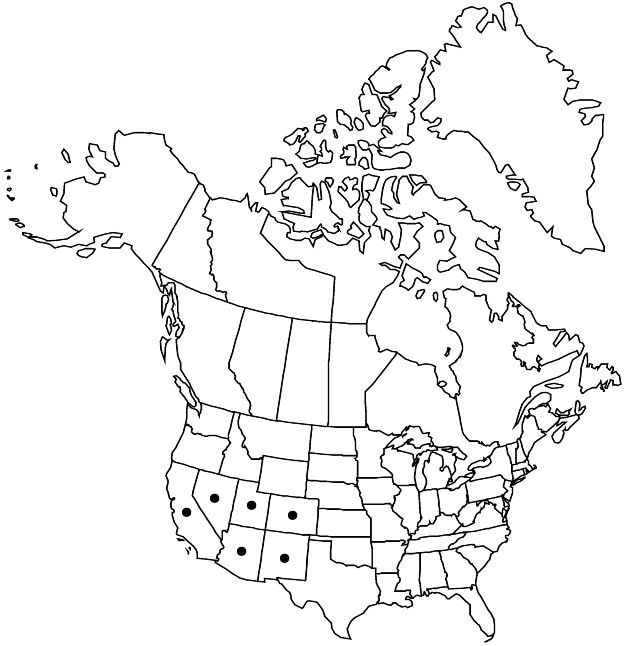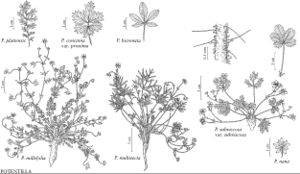Difference between revisions of "Potentilla concinna var. proxima"
Great Basin Naturalist 42: 25. 1982.
FNA>Volume Importer |
FNA>Volume Importer |
||
| Line 15: | Line 15: | ||
}}{{Treatment/ID/Special_status | }}{{Treatment/ID/Special_status | ||
|code=F | |code=F | ||
| − | |label= | + | |label=Illustrated |
}} | }} | ||
|basionyms={{Treatment/ID/Basionym | |basionyms={{Treatment/ID/Basionym | ||
|name=Potentilla proxima | |name=Potentilla proxima | ||
|authority=Rydberg | |authority=Rydberg | ||
| + | |rank=species | ||
|publication_title=in N. L. Britton et al., N. Amer. Fl. | |publication_title=in N. L. Britton et al., N. Amer. Fl. | ||
|publication_place=22: 339. 1908 | |publication_place=22: 339. 1908 | ||
| Line 26: | Line 27: | ||
|name=P. beanii | |name=P. beanii | ||
|authority=Clokey | |authority=Clokey | ||
| + | |rank=species | ||
}} {{Treatment/ID/Synonym | }} {{Treatment/ID/Synonym | ||
|name=P. diversifolia var. proxima | |name=P. diversifolia var. proxima | ||
|authority=(Rydberg) Soják | |authority=(Rydberg) Soják | ||
| + | |rank=variety | ||
}} | }} | ||
|hierarchy=Rosaceae;Rosaceae subfam. Rosoideae;Rosaceae tribe Potentilleae;Potentilla;Potentilla sect. Concinnae;Potentilla concinna;Potentilla concinna var. proxima | |hierarchy=Rosaceae;Rosaceae subfam. Rosoideae;Rosaceae tribe Potentilleae;Potentilla;Potentilla sect. Concinnae;Potentilla concinna;Potentilla concinna var. proxima | ||
| Line 45: | Line 48: | ||
|distribution=Ariz.;Calif.;Colo.;Nev.;N.Mex.;Utah. | |distribution=Ariz.;Calif.;Colo.;Nev.;N.Mex.;Utah. | ||
|discussion=<p>Of conservation concern.</p><!-- | |discussion=<p>Of conservation concern.</p><!-- | ||
| − | --><p>Variety proxima is the primary phase of <i>Potentilla concinna</i> in the mountains of southwestern Colorado, <i>Nevada</i>, and Utah. Some alpine collections from New Mexico are referable to < | + | --><p>Variety proxima is the primary phase of <i>Potentilla concinna</i> in the mountains of southwestern Colorado, <i>Nevada</i>, and Utah. Some alpine collections from New Mexico are referable to <i></i>var.<i> proxima</i>, and isolated populations also occur in the San Francisco Peaks of Arizona (at higher elevations than otherwise sympatric <i></i>var.<i> concinna</i>) and the White Mountains of California. Specimens from Montana keying here are provisionally placed in <i>P. macounii</i>.</p><!-- |
| − | --><p>The most distinctive feature of < | + | --><p>The most distinctive feature of <i></i>var.<i> proxima</i> is the elongate flowering stems, which are usually over twice as long as the leaves. Leaves tend to be more sparsely cottony and less bicolored than in the typical variety, the central leaflet is more often petiolulate, and flowers are commonly somewhat smaller. Collections from southwestern Utah and adjacent <i>Nevada</i>, including the type of <i>Potentilla</i> proxima, commonly have subpalmate leaves; elsewhere leaves are rarely or scarcely subpalmate.</p> |
|tables= | |tables= | ||
|references= | |references= | ||
| Line 55: | Line 58: | ||
-->{{#Taxon: | -->{{#Taxon: | ||
name=Potentilla concinna var. proxima | name=Potentilla concinna var. proxima | ||
| − | |||
|authority=(Rydberg) S. L. Welsh & B. C. Johnston | |authority=(Rydberg) S. L. Welsh & B. C. Johnston | ||
|rank=variety | |rank=variety | ||
| Line 69: | Line 71: | ||
|publication title=Great Basin Naturalist | |publication title=Great Basin Naturalist | ||
|publication year=1982 | |publication year=1982 | ||
| − | |special status=Conservation concern;Endemic; | + | |special status=Conservation concern;Endemic;Illustrated |
| − | |source xml=https://jpend@bitbucket.org/aafc-mbb/fna-data-curation.git/src/ | + | |source xml=https://jpend@bitbucket.org/aafc-mbb/fna-data-curation.git/src/f50eec43f223ca0e34566be0b046453a0960e173/coarse_grained_fna_xml/V9/V9_261.xml |
|subfamily=Rosaceae subfam. Rosoideae | |subfamily=Rosaceae subfam. Rosoideae | ||
|tribe=Rosaceae tribe Potentilleae | |tribe=Rosaceae tribe Potentilleae | ||
Revision as of 23:39, 16 December 2019
Stems (0.2–)0.6–1.6 dm, lengths 2–3(–4) times basal leaves. Basal leaves usually palmate to subpalmate, sometimes subpinnate; leaflets on tip or to distal 1/4 of leaf axis, ± overlapping, proximal pairs sometimes doubled often separated from others by 1–5(–10) mm of leaf axis; distal 1/3–2/3 of central leaflets incised 1/4–1/2 to midvein, teeth 2–4 per side, 1–3(–5) mm. Inflorescences (1–)3–12-flowered. Petals (2.5–)4–6 mm. Achenes 1.5–2 mm.
Phenology: Flowering mid summer.
Habitat: Alpine tundra, windswept ridges, stony meadows
Elevation: 2600–3900 m
Distribution

Ariz., Calif., Colo., Nev., N.Mex., Utah.
Discussion
Of conservation concern.
Variety proxima is the primary phase of Potentilla concinna in the mountains of southwestern Colorado, Nevada, and Utah. Some alpine collections from New Mexico are referable to var. proxima, and isolated populations also occur in the San Francisco Peaks of Arizona (at higher elevations than otherwise sympatric var. concinna) and the White Mountains of California. Specimens from Montana keying here are provisionally placed in P. macounii.
The most distinctive feature of var. proxima is the elongate flowering stems, which are usually over twice as long as the leaves. Leaves tend to be more sparsely cottony and less bicolored than in the typical variety, the central leaflet is more often petiolulate, and flowers are commonly somewhat smaller. Collections from southwestern Utah and adjacent Nevada, including the type of Potentilla proxima, commonly have subpalmate leaves; elsewhere leaves are rarely or scarcely subpalmate.
Selected References
None.
